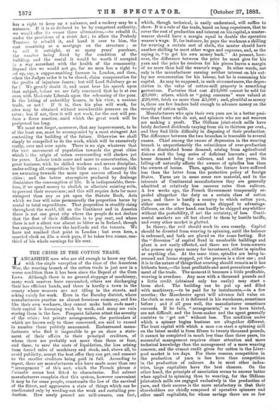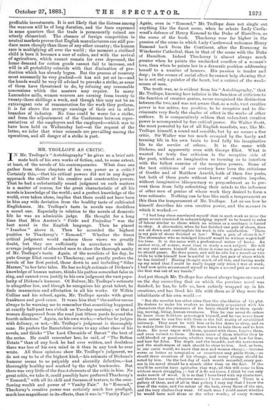J with the single exception of the time of the
American War, the weaving branch of the cotton trade is just now in a worse condition than it has been since the Repeal of the Corn Laws. Although there is no general stoppage of machinery, many weak masters have succumbed, others are discharging their less efficient hands, and there is hardly a town in the county where weavers are not idling in the streets, and asking vainly for work. Even in the Burnley district, where manufacturers practise an almost ferocious economy, and live like their own workmen, they cannot make both ends meet ; their capital is lessening week by week, and many see ruin staring them in the face. Frequent failures attest the severity of the crisis ; but private arrangements, the particulars of which are known only to those concerned, are said to exceed in number those publicly announced. Embarrassed manu- facturers who find it impossible to go on show a state- ment of their affairs to their principal creditors, of whom there are probably not more than three or four, and these, to save the costs of liquidation, the loss arising from forced sales of machinery and stock, and, above all, to avoid publicity, accept the best offer they can get, and consent to the smaller creditors being paid in full. According to report, there are manufacturers who have made more than one "arrangement" of this sort, which the French phrase a l'aimable seems best fitted to characterise. But solvent manufacturers complain that this system, however convenient it may be for some people, counteracts the law of the survival of the fittest, and aggravates a state of things which can be ameliorated only by weeding-out the weak and curtailing pro- duction. How sorely pressed are mill-owners, one fact,
which, though technical, is easily understood, will suffice to show. It is a rule of the trade, based on long experience, that to
cover the cost of production and interest on his capital,a master- weaver should have a margin equal to double the operative weaver's wage. If, for instance, he pays the workman a shilling for weaving a certain sort of cloth, the master should have another shilling to meet other wages and expenses, and, as the saying is, "to get his own money back." At present, how- ever, the difference between the price he mast give for his yarn and the price he receives for his pieces leaves a margin of no more than half the weaver's wage. In other words, not only is the manufacturer earning neither interest on his out- lay nor remuneration for his labour, but he is consuming his capital. As may be supposed, in such circumstances, the depre- ciation in the value of cotton-mill property is something portentous. Factories that cost ..13,000 cannot be sold for £3,000; others, which as "going concerns" were valued at £20,000, fetch no more than £5,000; and, plentiful as money is, there are few lenders bold enough to advance money on the security of cotton mills.
Manufacturers who spin their own yarn are in a better posi- tion than those who do not, and spinners who are not weavers are making a profit. The Oldham joint-stock mills have lately declared dividends varying from six to thirteen per cent., and they find little difficulty in disposing of their production. The difference between the two branches is traceable to several causes. Chief among the causes of depression in the weaving branch is unquestionably the coincidence of over-production with a diminished home demand, arising from agricultural distress and the long series of deficient harvests ; and the home demand being for calicoes, and not for yarns, its falling-off naturally affects the owners of spindles less than the owners of looms. Then, again, the former have suffered less than the latter from the protective policy of foreign States. Yarns are in some sense raw material, and in the interests of Continental manufacturers they are generally admitted at relatively less onerous rates than calicoes. A few weeks ago, the French Government temporarily re- pealed altogether the duty on a certain class of cotton yarn, and there is hardly a country to which cotton yarn, either coarse or fine, cannot be shipped to advantage. Calicoes, on the other hand, can hardly be shipped any whither without the probability, if no the certainty, of loss. Conti- nental markets are all but closed to them by hostile tariffs, and every other market is glutted.
In theory, the evil should work its own remedy. Capital should be diverted from weaving to spinning, until the balance is redressed, and both are placed on the same footing. But the " diversion " of capital fixed in unsaleable buildings and plant is not easily effected, and there are few loom-owners who possess any spare money for investment, either in spindles or anything else. At the same time, spindles are being in- creased and looms stopped, yet the process is a slow one ; and it is in the nature of things that weaving should remain as it has hitherto been,—the least profitable and most precarious depart- ment of the trade. The moment it becomes a little profitable, weaving is overdone. Any man with a thousand pounds and a little credit (obtained only too easily) may start a loom shed. The building can be put up and filled with machinery,—to be paid for by instalments,—in a few months; the Manchester agent 'will advance full value on the cloth as soon as it is delivered in his warehouse, sometimes before ; and if all goes well, the manufacturer sometimes succeeds. If he fails, "arrangements," as we have hinted, are not difficult, and the loom-maker and the agent generally contrive to "get out" without loss. The condition under which a spinner begins business are altogether different. The least capital with which a man can start a spinning mill on the latest model is from fifteen to twenty thousand pounds, it cannot be completed in much less time than three years, its successful management requires closer attention and more technical knowledge than the management of a mere weaving concern, and the utmost credit given for cotton in the Liver- pool market is ten days. For these reasons, competition in the production of yarn is less keen than competition in the production of calicoes. As in most other indus- tries, large capitalists have the best chances. On the other hand, the principle of association seems to answer better when applied to spinning than to weaving, for the Oldham joint-stock mills are engaged exclusively in the production of yarn, and their success is the more satisfactory in that their shareholders are chiefly composed of operative spinners and other small capitalists, for whose savings there are so few
profitable investments. It is not likely that the distress among the weavers will be of long duration, and the fears expressed in some quarters that the trade is permanently ruined are utterly chimerical. The absence of foreign competition in neutral markets proves that English manufacturers can still pro- duce more cheaply than those of any other country ; the human race is multiplying all over the world ; the moment a civilised child is born it becomes a user of calico, and with the revival of agriculture, which cannot remain for ever depressed, the home demand for cotton goods cannot fail to increase, and will in all probability coincide with that diminution of pro- duction which has already begun. But the process of recovery must necessarily be very gradual—it has not yet set in—and the hands would be very ill advised to provoke a strike, as some of them have threatened to do, by refusing any reasonable concessions which the masters may require. In many Lancashire mills, women weavers are earning from twenty to twenty-three shillings a week, and though this may not be an extravagant rate of remuneration for the work they perform, it is far above the average earnings of their sex in other branches of industry. No time could be worse for a strike, and from tho adjournment of the Conference between repre- sentatives of the employers and the employed—which was to have been held on Wednesday last—at the request of the latter, we infer that wiser counsels are prevailing among the operatives, and all danger of a strike is past.



































 Previous page
Previous page